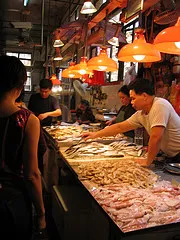
China’s inflation plunges to 14-month low in November
At 4.2%, the country’s inflation surprised the market, having dropped faster than expected.
Looking into 2012, HSBC says China's top macro risk is shifting quickly from inflation to growth, as November's growth data will likely confirm a further slowdown.
Here’s more from HSBC:
| November CPI and PPI numbers both fell below market expectation. The key macro risk is shifting swiftly away from inflation towards growth. The 2011 Central Economic Work Conference, to be held next week, will likely make growth stabilization the top policy priority for next year. We expect more aggressive easing measures going into 2012. Facts: At 4.2% y-o-y, November's headline CPI growth eased at a notably faster pace than both we and market had expected (vs. consensus 4.5% y-o-y and 5.5% y-o-y in October). This is the lowest CPI reading since September 2010 and stands close to the 4% official annual target. Similar to the previous month, two factors led the slowdown: This translated into its first single digit y-o-y print in eleven months (8.8% y-o-y in November vs. 11.9% y-o-y in October). Of note, pork price inflation continued to decelerate sharply to 26.5% y-o-y in November after rising 38.9% y-o-y in October, accounting for 19% of headline CPI growth, compared to over 20% in previous months. Seasonally adjusted, headline CPI fell 0.1% m-o-m in November, compared to an increase of 0.2% m-o-m previously. By our estimation, food CPI fell 0.7% m-o-m in November, in contrast to an increase of 0.4% m-o-m in October. Non-food inflation eased further to an eleven-month low of 2.2% y-o-y in November, versus 2.7% y-o-y in October. Its sequential m-o-m growth rate stayed almost unchanged for the third consecutive month, after seasonal adjustment. At 2.7% y-o-y, November's producer price inflation growth decelerated sharply to its lowest level since December 2009. This was significantly below market expectations of 3.5% y-o-y and October's 5.0% y-o-y. Seasonally adjusted, PPI contracted by 0.6% m-o-m, by our estimate. The easing was broad-based. PPI for producer goods decelerated to 2.6% y-o-y in November from 5.2% y-o-y in October; while PPI for consumer goods slowed to 3.1% y-o-y in November from 4.2% y-o-y in October. Implications We expect inflation to ease further in the coming quarters. Although food prices will likely spike during Chinese New Year, its growth should remain contained thanks to a recent good harvest, the recent downturn in China's pork price cycle, and the impact of earlier supply-side measures. The sharply easing PPI should also have a knock on impact on non-food CPI growth, helping to sustain the latter's current slowdown. Looking into 2012, China's top macro risk is shifting quickly from inflation to growth. November's growth data will likely to confirm a further slowdown. All these call for more aggressive easing. China's long-awaited Central Economic Work Conference, to be held 12-14 December, will likely send a clearer message to markets about Beijing's policy priority in the coming year. We believe growth will resume its position as the government's top policy focus, underpinning our expectations for additional monetary and fiscal easing measures in coming quarters. Bottom line: Growth is resuming its position as China's top macro risk, underpinning our expectations for Beijing to ease monetary and fiscal measures further in their bid to stabilize growth.
|








![Cross Domain [Manu + SBR + ABF + ABR + FMCG + HBR + ]](https://cmg-qa.s3.ap-southeast-1.amazonaws.com/s3fs-public/styles/exclusive_featured_article/public/2025-01/earth-3537401_1920_4.jpg.webp?itok=WaRpTJwE)









 Advertise
Advertise


